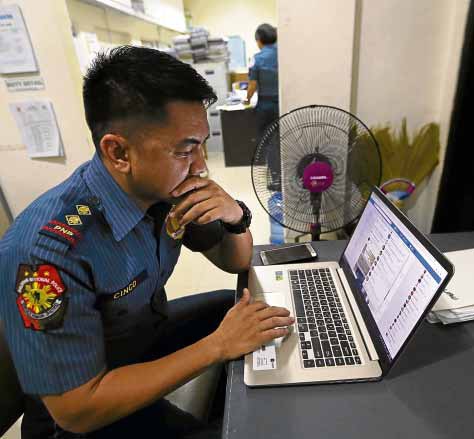Victims of online love scams rising

ANTICYBERCRIME Senior Insp.Artemio Cinco, spokesperson for the Philippine National PoliceAnti-Cybercrime Group at Camp Crame, checks love scam cases developing on dating sites and Facebook. —PHOTO BY LYN RILLON
(Last of two parts)
Anyone among the 67 million Filipinos and the tens of millions of other people who are logged on the internet at any one time could be a suspect or a victim in the online “love scam” — an elaborate swindle that plays on the desire for both romance and wealth, according to the Philippine National Police Anti-Cybercrime Group (PNP-ACG).
Such scams are not easy to solve because “you do not know where to start looking for the person” who had conned another, said the ACG, the agency primarily responsible for enforcing the country’s cybercrime laws.
“One problem here is the love scam is really one where the victim has consent. They are willing victims,” said Senior Insp. Artemio Cinco Jr., ACG spokesperson.
It is legally a case of estafa, a private offense that requires a private complainant, Cinco said.
“We need them (complainants) to file a case [for us] to investigate. Without them, we cannot do anything,” he said.
Probers also find the road leading to a scammer becoming narrower when his or her Facebook account is deleted, or when a bank or a money transfer company refuses to give details of fund transactions.
Blank wall
“We have nowhere to go,” Cinco said, citing data privacy and bank secrecy laws.
In some cases it investigated, the ACG found that some victims still kept sending money to their cyberlovers, even after sensing that something was wrong.
“They expect something in return, so they are willing victims,” Cinco explained.
“That is normally the case because the victim knows there’s a ‘package’ from a foreigner who could offer him or her a comfortable life,” he said.
Some still hold on to the belief that love had indeed bloomed online, but Cinco scoffed at this: “It is rare to fall in love online.”
“How could you fall in love with somebody on the internet? I mean there’s always this thought at the back of your mind that the person is a foreigner … You are expecting something in exchange for the money you shell out. So it’s really greed,” he said.
According to the US-based Better Business Bureau (BBB), the love or romance scam is among the biggest cons in the United States and Canada, where victims lost nearly US$1 billion over the last three years.
Dating websites
There has also been an increase in the number of reported victims—from 21,000 in 2015 to 28,000 in 2017. Most of them had met the scammers on dating websites, BBB said.
“Con artists create compelling back stories and full-fledged identities then trick you into falling for someone who doesn’t even exist,” it said, calling the ploy “catfishing.”
They start with fake profiles on online dating sites, stealing photos and text “from real accounts or elsewhere,” BBB said. They often claim to be in the military or working overseas who cannot meet their preys in person.
Soon, a fake relationship is developed through the exchange of photos and romantic messages, “even talking on the phone or through a webcam,” BBB said.
“Just when the relationship seems to be getting serious, your new sweetheart has a health issue or family emergency, or wants to plan a visit. No matter the story, the request is the same: they need money. But after you send money, there’s another request, and then another. Or the scammer stops communicating altogether,” it said.
Hunting ground
In the Philippines, Facebook is the favored hunting ground for predators in search of people wanting romance or just friendship.
The love scammer initiates contact before starting the getting-to-know-you stage and proceeds to profess love, which comes roughly after a month or two.
In the third month, when trust and affection have been established, the online boyfriend or girlfriend is suddenly caught in a series of misfortunes.
Detecting a scammer
“They (scammers) never ask for money outright because it would immediately cramp their style. They usually wait for the offer. Sometimes another person or third party would turn up to make his or her story more realistic,” Cinco said.
Cinco offered the public a few tips on how to detect or avoid a love scammer, especially on Facebook.
Be careful about newly created accounts.
Find out when the account was created and check the friends list.
Try to message some of the friends to ask them about your new online friend.
Be suspicious of accounts with less than 20 friends, mostly from different countries.
“If you find that you and the other person are the only ones conversing, and the friends are always quiet, that would be suspicious,” Cinco said.
A love scammer would always find an excuse not to meet in person, he added.
Bad connection
A scammer who agrees to talk on Skype, or any other form of video chat, would dim his or her image and surroundings, or complain about bad connection, to avoid being clearly identifiable, he said.
Sometimes, the scammer would isolate the intended victim from other people online by suggesting other means of communication or even asking that his or her own Facebook account be deleted to prevent the fraud from being discovered by others.
“You should take note of the accent or pronunciation of words and make sure it jibes with the nationality that the other person is claiming to have,” Cinco said, suggesting also to check your new online friend’s grammar and spelling.
If you suspect the use of fake photographs, use any of the numerous mobile apps and computer programs that can trace the original source of the pictures through reverse image searches, he said.
But the best way to avoid falling for a love scammer or any other con artist for that matter, is living by the truism: If it’s too good to be true, then it probably is.